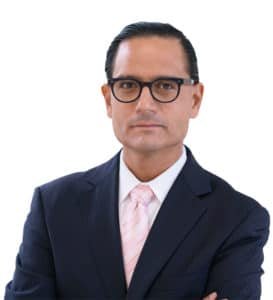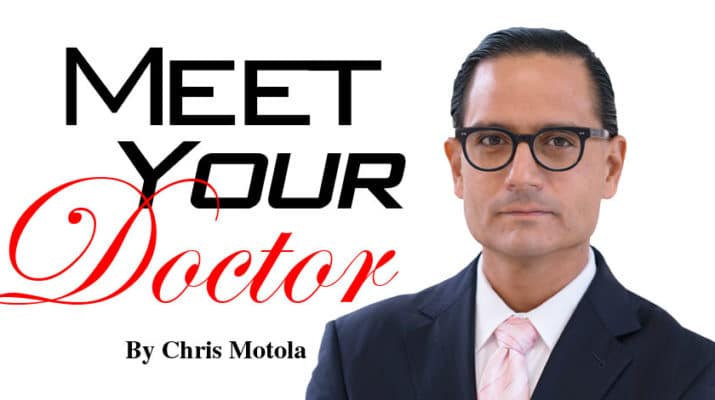Roswell Park chairman of dermatology department discusses his research in finding new ways to treat skin cancer
By Chris Motola

Q: Can you describe your role at the Roswell Park Comprehensive Cancer Center?
A: I’m the chair of the department of dermatology at Roswell Park. I’m also a professor of oncology. As far as my role goes, there are three principle activities that constitute the role. The first and foremost is helping the department to provide the best care possible to patients who have had cancer or are at a high risk of developing cancer. A little bit differently than the rest of Roswell Park, though, dermatology has a broader scope of practice. Meaning that we’ll often see individuals who have no history of cancer for skin conditions if they’re concerned about something on their skin they don’t recognize. We do that by performing skin checks and deciding whether it’s a neoplasm, a rash or even something that doesn’t even need to be treated at all. So I’m trying to optimize how we perform that role in Western New York. The second activity is actually providing care myself. My focus has been on caring for high-risk skin cancer patients. I define that as individuals who have had numerous skin cancers in that past as well as those who have conditions that put them at high risk for developing skin cancer like immuno-suppression or conditions where they’re born without a normal immune system. For patients taking drugs that suppress their immune system after, say, a transplant, their risk of getting skin cancer can go up 100 fold. And the third role is my laboratory role. My focus there is on how the immune system can be used to control the growth and spread of cancers.
Q: Are we talking immunotherapy?
A: It is like an immunotherapy, but what I think is interesting about the research is that where immunotherapy is harnessing the adaptive immune system and using the T-cells to attack the cancer — or even instructing dendritic cells to activate T-cells to target the cancer — the focus of our lab has been on helping the innate immune system, meaning macrophages. The reason I say it’s interesting is because unlike T-cells, macrophages, in large numbers, when present in the tumor, seem to feed the tumor by creating an environment that supports tumor growth. So it is an immunotherapy, but it’s almost an inverted view of immunotherapy. So we’re interested in seeing if we can target the cell and change its polarization state so it begins to control the cancer or target it for elimination. We’re also trying to figure out what it’s doing to really feed or support cancer growth. Because those downstream functions of the macrophage may be targetable themselves.
Q: How do you go about doing that?
A: For the macrophages, the lab is pretty much a basic science lab at this point. We’re not yet at the point of having therapeutics at present. What we have done is characterized some of the metabolic functions and figured out that if we interrupt pathways of nitrogen metabolism in macrophages [so] they can switch from being pro-tumor to anti-tumor. At this point, we’re piloting therapies in animal models of cancer, but we’re not quite at the stage where we can deliver it to humans.
Q: Assuming it’s successful what advantages will it offer?
A: I think the advantages are huge. At present if someone’s at high risk for developing skin cancer, they may have easily as many as 10 independent skin surgeries each year. That’s not that unusual. So the quality of life is severely impacted, and each of those skin cancers has a risk of spreading or metastasizing. So the advantage of targeting at-risk skin is to reduce the number of skin cancers that develop and keep the skin at an earlier stage of cancer development. This would reduce the number of surgeries needed and hopefully improve long-term outcomes for these high-risk patients.
Q: What’s the next milestone you’re trying to reach?
A: Within the lab, we’re actively trying to figure out the mechanism by which the treatment is working. It clearly does work, but we’d like to get a better sense of how it’s working. We’ll continue to treat pre-clinical models to see whether we can consider bringing it to human trials.
Q: What percentage of your patients are high risk?
A: Within my practice, the vast majority of patients are high risk. We’re really focused on patients who have had solid organ transplants and stem cell transplants. In addition to that clinic, I also re-started a clinic that uses photodynamic therapy to treat at-risk skin. It’s used to target precancerous lesions, usually on the face, with the goal of reducing the number of cancers that develop. It’s an FDA-approved therapy. The way it works is, a drug is applied to the skin and allowed to incubate for about an hour. Precancerous cells take up the drug and activate it, then light leads to oxidated death of the cells that take up the drug. I think of it kind of like a Trojan horse approach. Those cells die, selectively, leaving your normal cells alone.
Q: That sounds pretty useful. Is there a reason it’s not more widely adopted?
A: It is used and has been approved for awhile, but it’s probably due to the equipment involved. The light source is a bit bulky, so a lot of offices may not be equipped to use it. It’s also time-consuming because you have an hour or two of incubation. We use a staggered approach to allow us to take care of a number of patients in one afternoon.
Q: To what degree is the sun responsible for most of these cancers? Do you think the populace under- or over-estimates the risks?
A: Sure. Sun exposure, particularly ultraviolet radiation, is carcinogenic. It’s the leading cause of the mutations that are required for the development of skin cancer. From the press I’ve read, I don’t see any of it being an overestimation, whether it’s from the sun or even worse, tanning beds, when it comes to the risk of developing cancer.
Lifelines
Name: Oscar R. Colegio, M.D., Ph.D.
Position: Chairman of dermatology department and a professor of oncology at Roswell Park Comprehensive Cancer Center;
Education: Yale University School of Medicine (Ph.D. in cell biology in 2003 and an M.D. degree in 2004); University of Texas at Austin (bachelor’s degree in pharmacy in 1995). Internship in internal medicine and a residency in dermatology at Yale-New Haven Hospital (2004-2008)
Hometown: McAllen, Texas
Affiliations: Roswell Park Comprehensive Cancer Center
Organizations: International Immunosuppression and Transplant Skin Cancer Collaborative; American Academy of Dermatology; Society for Investigative Dermatology
Family: Wife, two sons
Hobbies: Running, biking, cooking, baking

